Gary F. Marcus Quotes & Sayings
Enjoy the top 22 famous quotes, sayings and quotations by Gary F. Marcus.
Famous Quotes By Gary F. Marcus
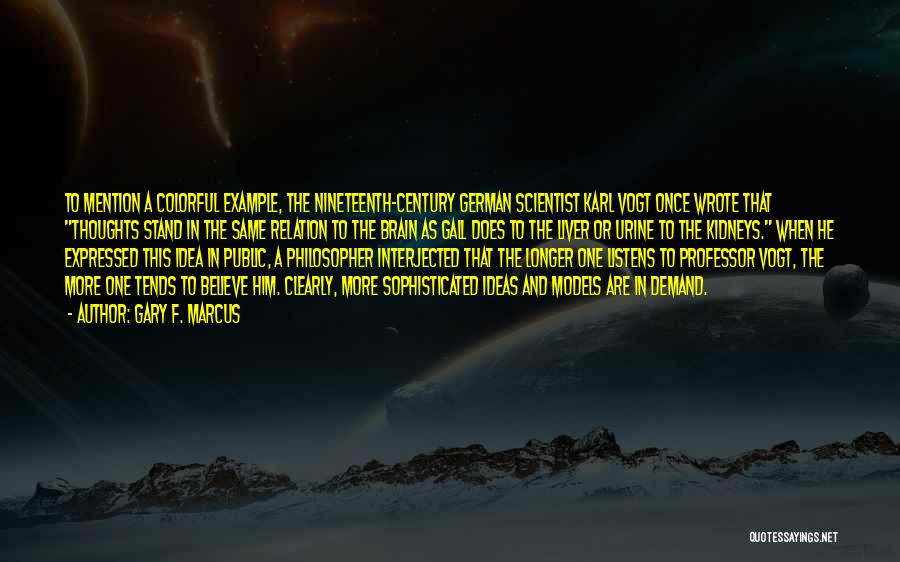
To mention a colorful example, the nineteenth-century German scientist Karl Vogt once wrote that "thoughts stand in the same relation to the brain as gall does to the liver or urine to the kidneys." When he expressed this idea in public, a philosopher interjected that the longer one listens to Professor Vogt, the more one tends to believe him. Clearly, more sophisticated ideas and models are in demand. — Gary F. Marcus
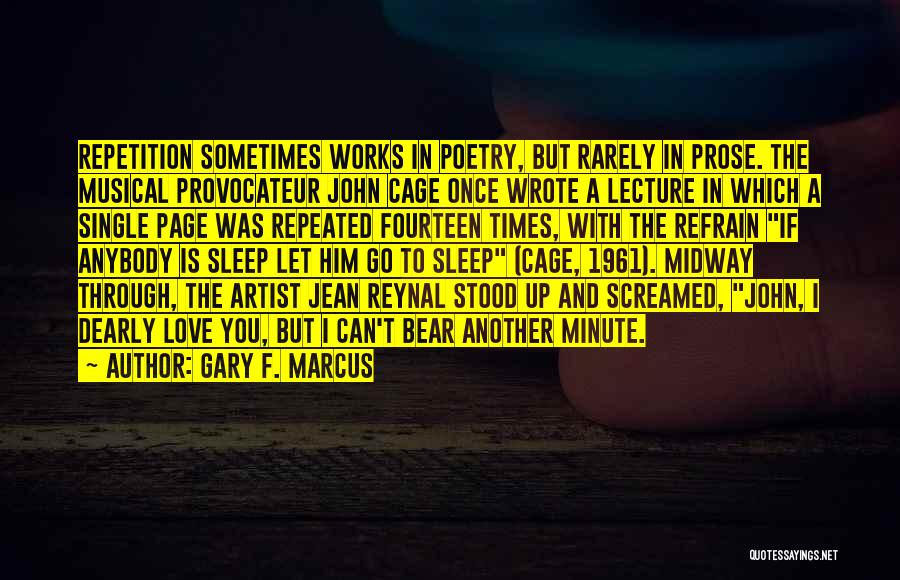
Repetition sometimes works in poetry, but rarely in prose. The musical provocateur John Cage once wrote a lecture in which a single page was repeated fourteen times, with the refrain "If anybody is sleep let him go to sleep" (Cage, 1961). Midway through, the artist Jean Reynal stood up and screamed, "John, I dearly love you, but I can't bear another minute. — Gary F. Marcus
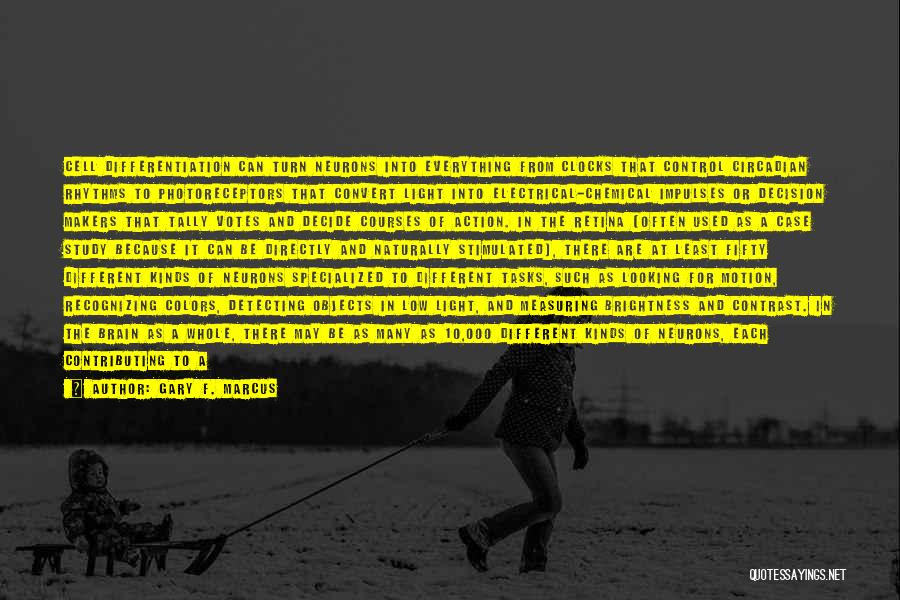
Cell differentiation can turn neurons into everything from clocks that control circadian rhythms to photoreceptors that convert light into electrical-chemical impulses or decision makers that tally votes and decide courses of action. In the retina (often used as a case study because it can be directly and naturally stimulated), there are at least fifty different kinds of neurons specialized to different tasks, such as looking for motion, recognizing colors, detecting objects in low light, and measuring brightness and contrast. In the brain as a whole, there may be as many as 10,000 different kinds of neurons, each contributing to a different aspect of mental life. — Gary F. Marcus
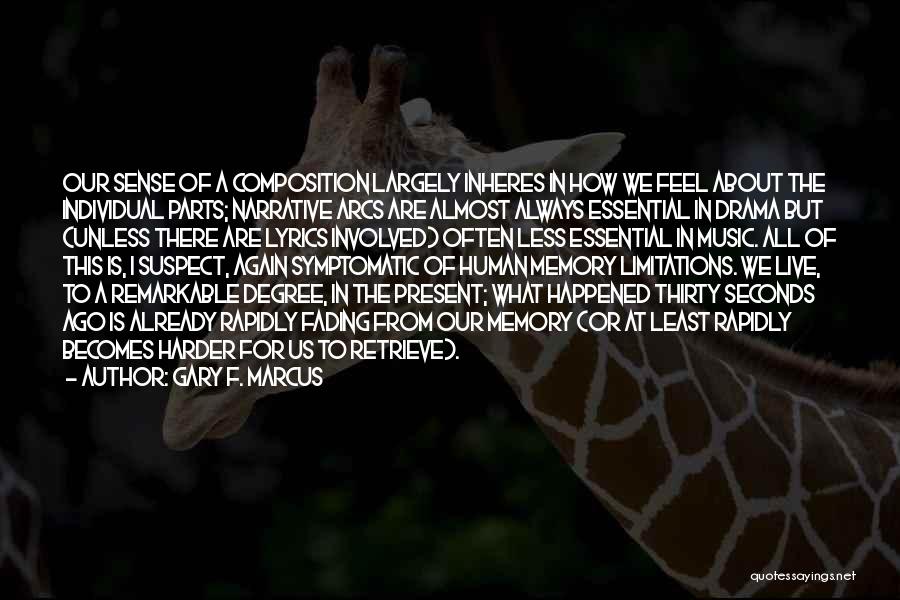
Our sense of a composition largely inheres in how we feel about the individual parts; narrative arcs are almost always essential in drama but (unless there are lyrics involved) often less essential in music. All of this is, I suspect, again symptomatic of human memory limitations. We live, to a remarkable degree, in the present; what happened thirty seconds ago is already rapidly fading from our memory (or at least rapidly becomes harder for us to retrieve). — Gary F. Marcus
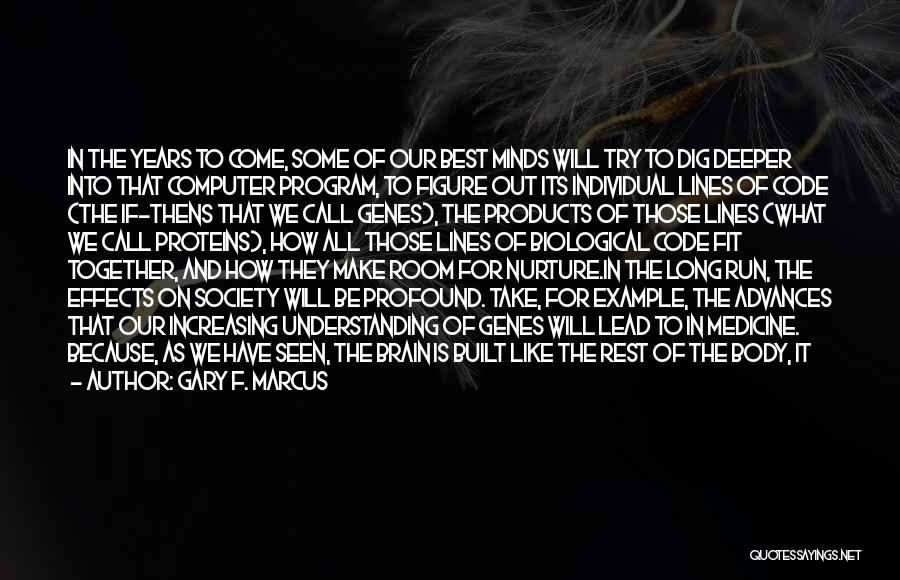
In the years to come, some of our best minds will try to dig deeper into that computer program, to figure out its individual lines of code (the IF-THENS that we call genes), the products of those lines (what we call proteins), how all those lines of biological code fit together, and how they make room for nurture.
In the long run, the effects on society will be profound. Take, for example, the advances that our increasing understanding of genes will lead to in medicine. Because, as we have seen, the brain is built like the rest of the body, it is also amenable to many of the same types of treatment. For example, stem cell therapies originally developed for leukemia are being adapted to treat Parkinson's disease and Huntington's disease. Gene therapies developed for cystic fibrosis may someday help treat brain tumors. Both work by harnessing the body's own toolkit for development. — Gary F. Marcus
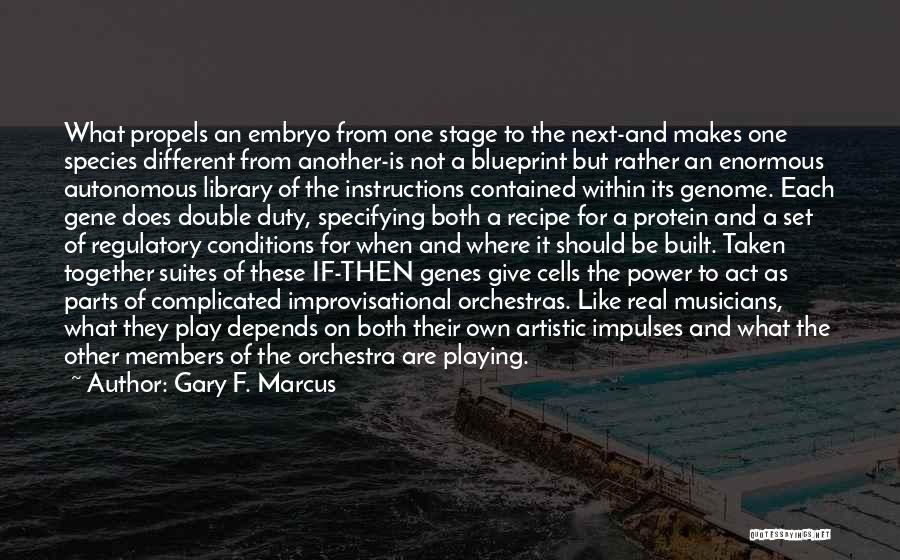
What propels an embryo from one stage to the next-and makes one species different from another-is not a blueprint but rather an enormous autonomous library of the instructions contained within its genome. Each gene does double duty, specifying both a recipe for a protein and a set of regulatory conditions for when and where it should be built. Taken together suites of these IF-THEN genes give cells the power to act as parts of complicated improvisational orchestras. Like real musicians, what they play depends on both their own artistic impulses and what the other members of the orchestra are playing. As we will see in the next chapter, every bit of this process-from the Cellular Big 4 to the combination of regulatory cues-holds as much for development of the brain as it does for the body. — Gary F. Marcus
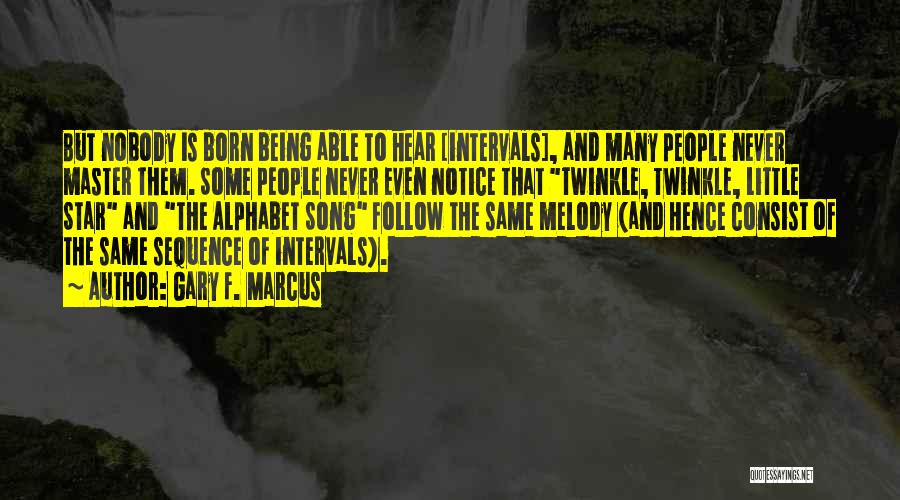
But nobody is born being able to hear [intervals], and many people never master them. Some people never even notice that "Twinkle, Twinkle, Little Star" and "The Alphabet Song" follow the same melody (and hence consist of the same sequence of intervals). — Gary F. Marcus
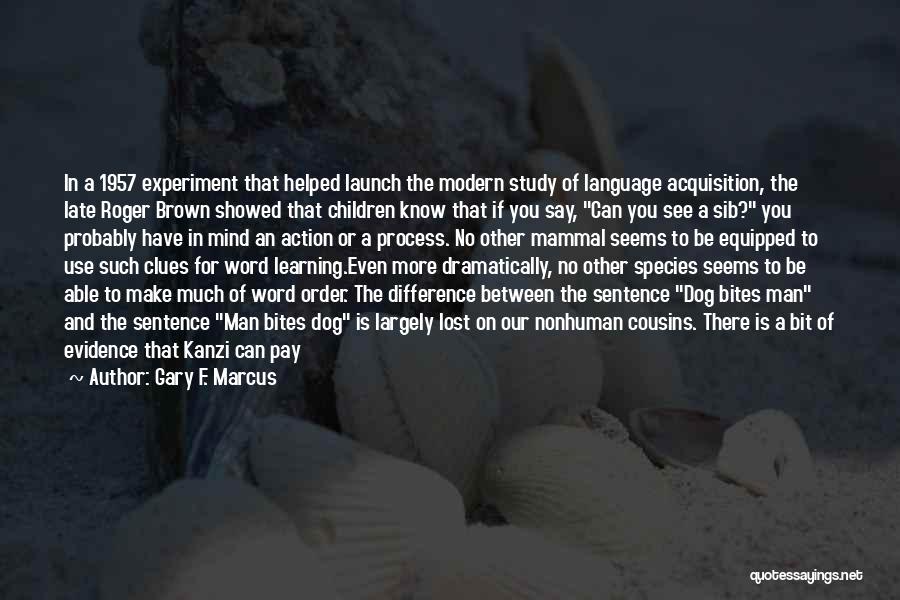
In a 1957 experiment that helped launch the modern study of language acquisition, the late Roger Brown showed that children know that if you say, "Can you see a sib?" you probably have in mind an action or a process. No other mammal seems to be equipped to use such clues for word learning.
Even more dramatically, no other species seems to be able to make much of word order. The difference between the sentence "Dog bites man" and the sentence "Man bites dog" is largely lost on our nonhuman cousins. There is a bit of evidence that Kanzi can pay attention to word order to some tiny extent, but certainly not in anything like as rich a fashion as a three-year-old human child. — Gary F. Marcus
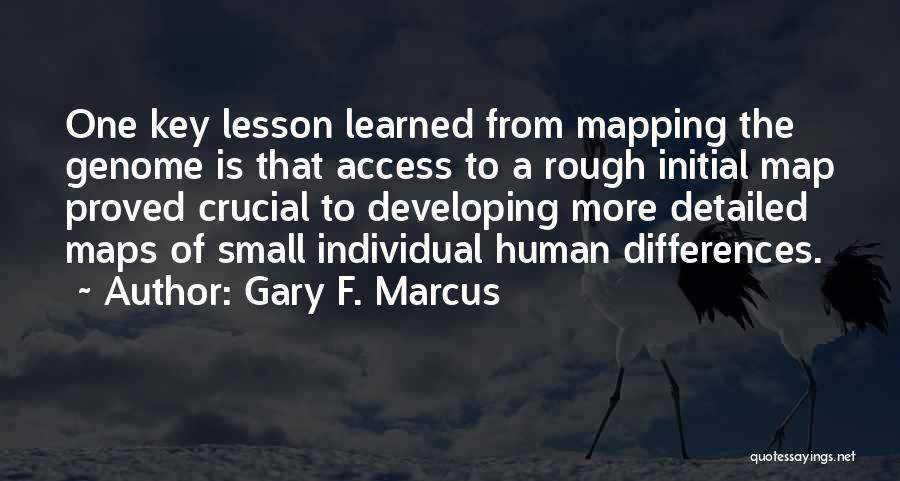
One key lesson learned from mapping the genome is that access to a rough initial map proved crucial to developing more detailed maps of small individual human differences. — Gary F. Marcus
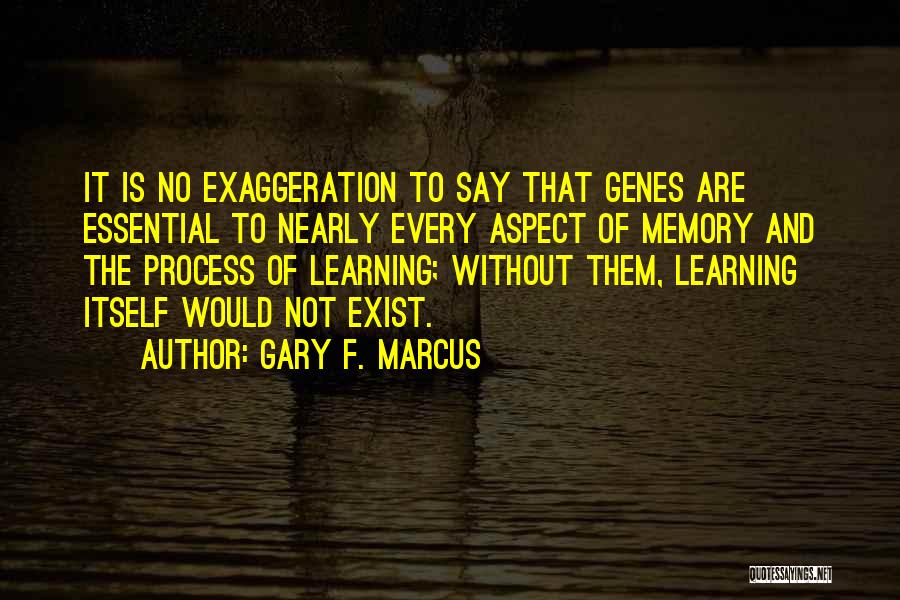
It is no exaggeration to say that genes are essential to nearly every aspect of memory and the process of learning; without them, learning itself would not exist. — Gary F. Marcus
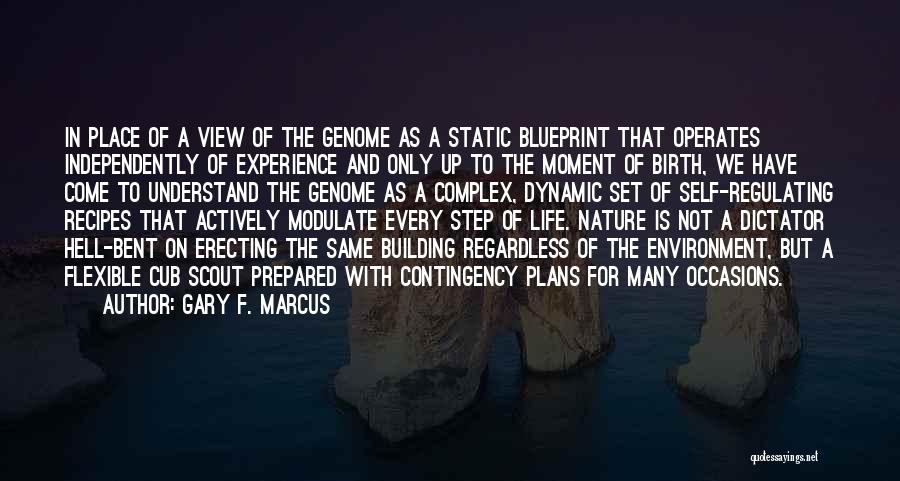
In place of a view of the genome as a static blueprint that operates independently of experience and only up to the moment of birth, we have come to understand the genome as a complex, dynamic set of self-regulating recipes that actively modulate every step of life. Nature is not a dictator hell-bent on erecting the same building regardless of the environment, but a flexible Cub Scout prepared with contingency plans for many occasions. — Gary F. Marcus
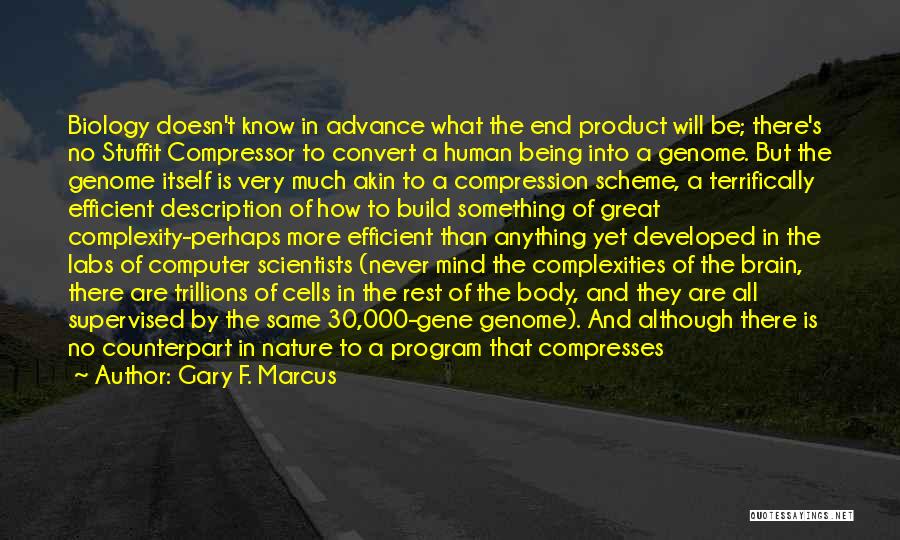
Biology doesn't know in advance what the end product will be; there's no Stuffit Compressor to convert a human being into a genome. But the genome itself is very much akin to a compression scheme, a terrifically efficient description of how to build something of great complexity-perhaps more efficient than anything yet developed in the labs of computer scientists (never mind the complexities of the brain, there are trillions of cells in the rest of the body, and they are all supervised by the same 30,000-gene genome). And although there is no counterpart in nature to a program that compresses a picture into a compact description, there is a natural counterpart to the program that decompresses the compressed encoding, and that's the cell. Genome in, organism out. Through the logic of gene expression, cells are self-regulating factories that translate genomes into biological structure. — Gary F. Marcus
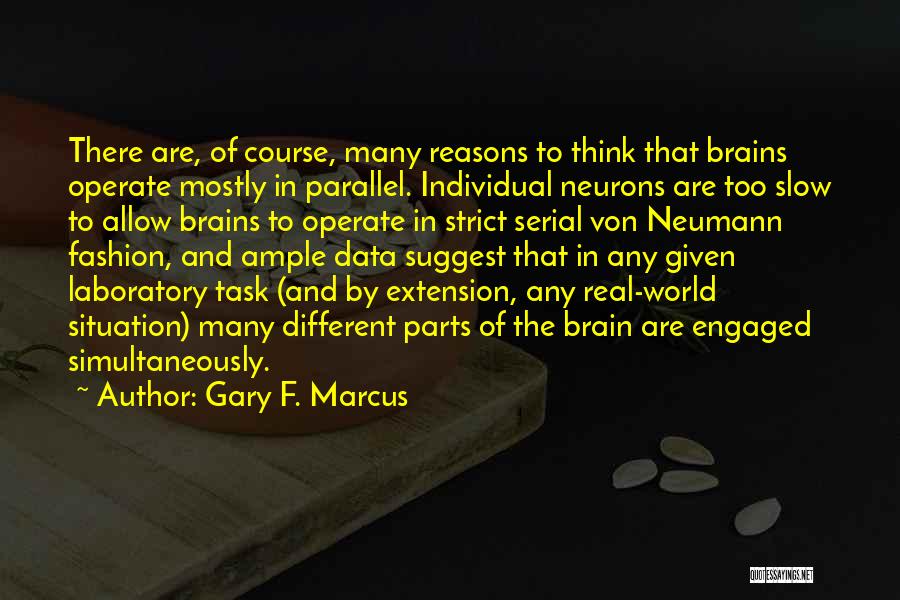
There are, of course, many reasons to think that brains operate mostly in parallel. Individual neurons are too slow to allow brains to operate in strict serial von Neumann fashion, and ample data suggest that in any given laboratory task (and by extension, any real-world situation) many different parts of the brain are engaged simultaneously. — Gary F. Marcus
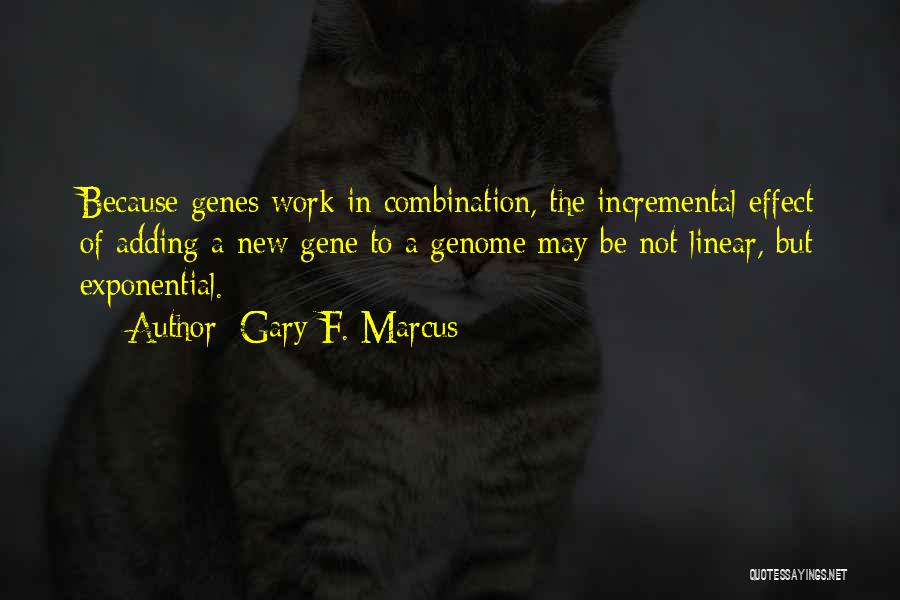
Because genes work in combination, the incremental effect of adding a new gene to a genome may be not linear, but exponential. — Gary F. Marcus
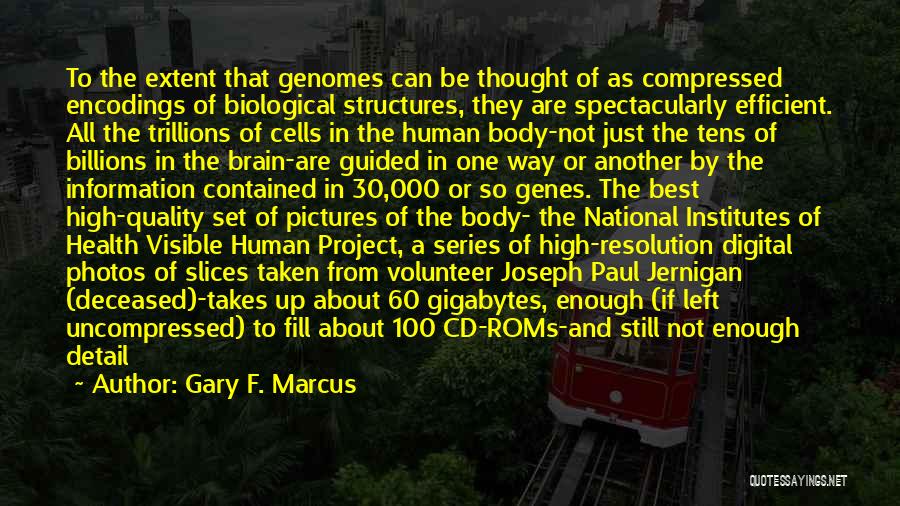
To the extent that genomes can be thought of as compressed encodings of biological structures, they are spectacularly efficient. All the trillions of cells in the human body-not just the tens of billions in the brain-are guided in one way or another by the information contained in 30,000 or so genes. The best high-quality set of pictures of the body- the National Institutes of Health Visible Human Project, a series of high-resolution digital photos of slices taken from volunteer Joseph Paul Jernigan (deceased)-takes up about 60 gigabytes, enough (if left uncompressed) to fill about 100 CD-ROMs-and still not enough detail to capture individual cells. The genome, in contrast, contains only about 3 billion nucleotides, the equivalent (at two bits per nucleotide) of less than two-thirds of a gigabyte, or a single CD-ROM. — Gary F. Marcus

Sometimes guitar riffs get repeated over and over ("vamping," in the lingo of musicians), but generally there is a soloist proving variation that runs above that background, lest the song sound monotonous. Philip Glass's minimalist compositions (such as the soundtrack to 'Koyaanisqatsi') deviate from much of the classical music that preceded them, with much less obvious movement than, say, the Romantic-era compositions that his work seems to rebel against, yet his works, too, consist not only of extensive repetition but also of constant (though subtle) variation. Virtually every song you've ever heard consists of exactly that: themes that recur over and over, overlaid with variations. — Gary F. Marcus
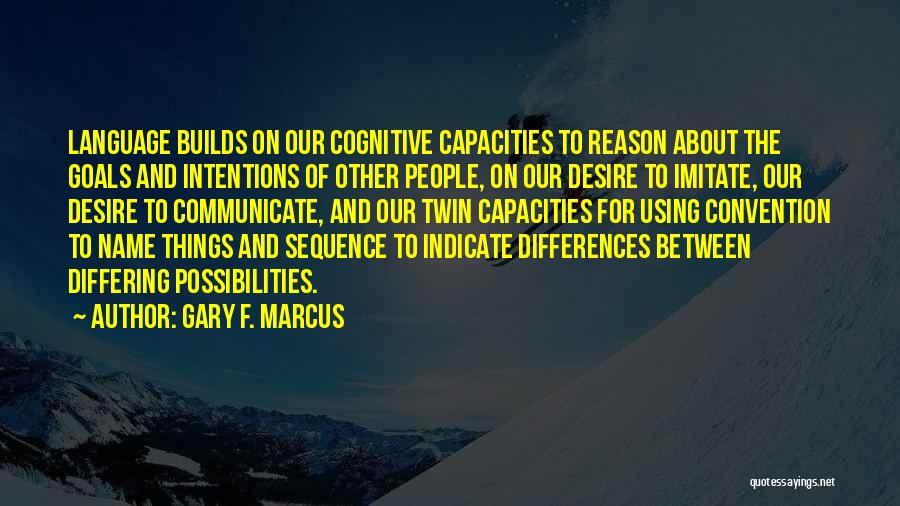
Language builds on our cognitive capacities to reason about the goals and intentions of other people, on our desire to imitate, our desire to communicate, and our twin capacities for using convention to name things and sequence to indicate differences between differing possibilities. — Gary F. Marcus
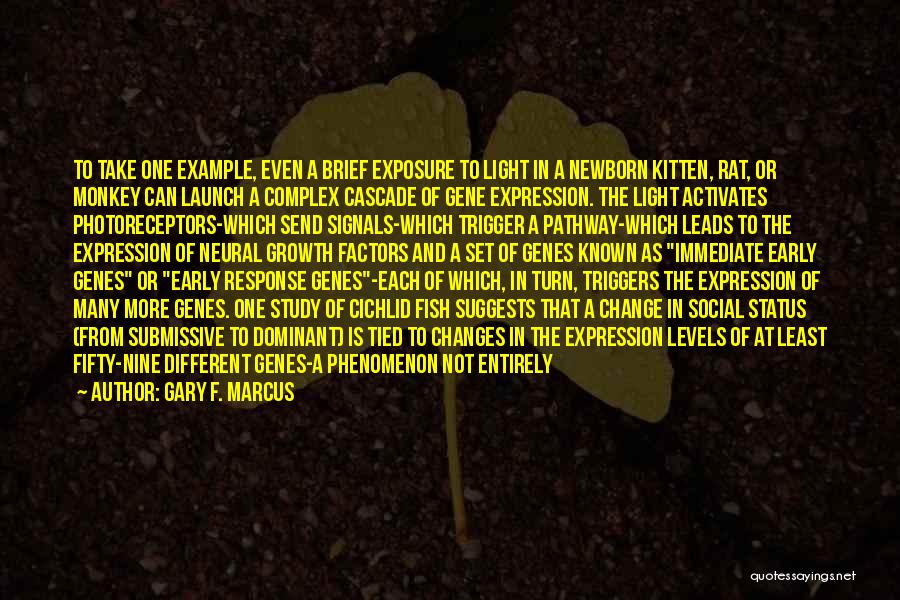
To take one example, even a brief exposure to light in a newborn kitten, rat, or monkey can launch a complex cascade of gene expression. The light activates photoreceptors-which send signals-which trigger a pathway-which leads to the expression of neural growth factors and a set of genes known as "immediate early genes" or "early response genes"-each of which, in turn, triggers the expression of many more genes. One study of cichlid fish suggests that a change in social status (from submissive to dominant) is tied to changes in the expression levels of at least fifty-nine different genes-a phenomenon not entirely unrelated to the testosterone rush that Joe-six-pack gets when the home team wins. — Gary F. Marcus
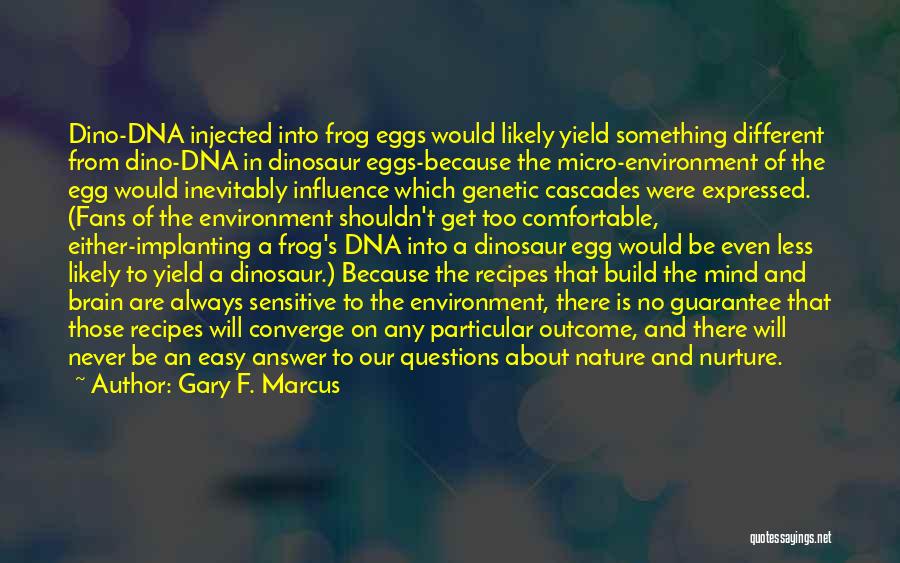
Dino-DNA injected into frog eggs would likely yield something different from dino-DNA in dinosaur eggs-because the micro-environment of the egg would inevitably influence which genetic cascades were expressed. (Fans of the environment shouldn't get too comfortable, either-implanting a frog's DNA into a dinosaur egg would be even less likely to yield a dinosaur.) Because the recipes that build the mind and brain are always sensitive to the environment, there is no guarantee that those recipes will converge on any particular outcome, and there will never be an easy answer to our questions about nature and nurture. — Gary F. Marcus
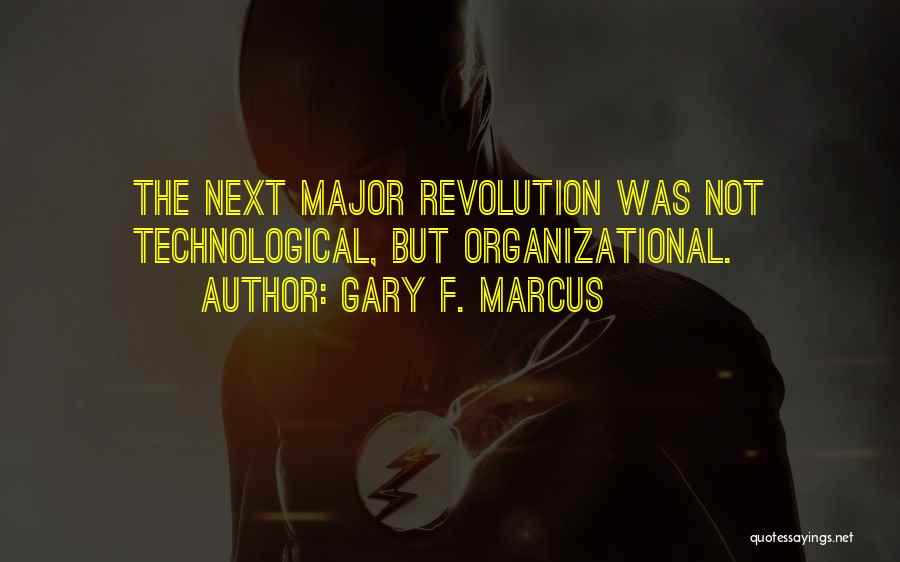
The next major revolution was not technological, but organizational. — Gary F. Marcus
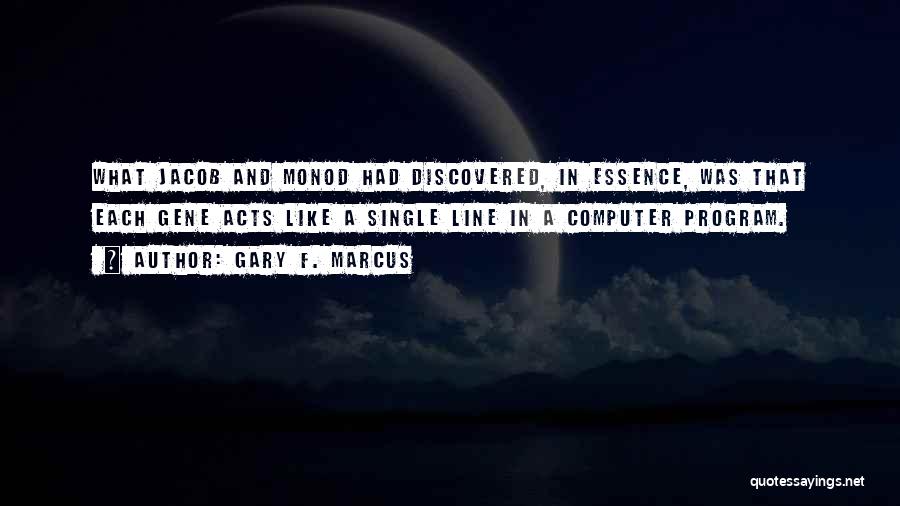
What Jacob and Monod had discovered, in essence, was that each gene acts like a single line in a computer program. — Gary F. Marcus
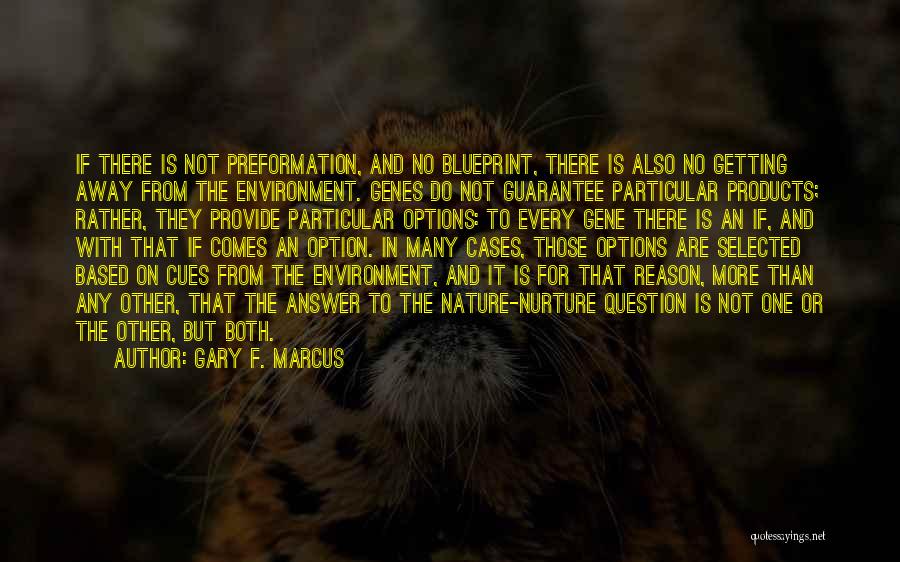
If there is not preformation, and no blueprint, there is also no getting away from the environment. Genes do not guarantee particular products; rather, they provide particular options: To every gene there is an IF, and with that IF comes an option. In many cases, those options are selected based on cues from the environment, and it is for that reason, more than any other, that the answer to the nature-nurture question is not one or the other, but both. — Gary F. Marcus





